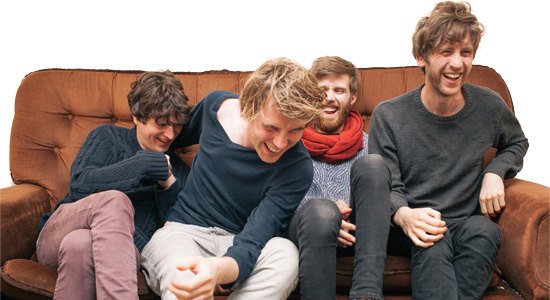
The noise merchants of Girl Band vow not to fade away like their Irish predecessors
While Dublin’s Girl Band isn’t the first Emerald Isle-based outfit to play noisy rock or have designs beyond the nation’s small touring circuit, part of the four-year-old group’s modus operandi is to break the lack-of-industriousness model that guitarist Alan Duggan has seen bury so many decent bands before his.
“When we started, bands didn’t tour outside of Ireland,” he says. “There were obviously bands doing it, but it wasn’t the norm. We really wanted to make an e ort to not be seen as purely an Irish band in an Irish context, because what happened to a lot of bands is they’d play a couple Dublin shows, release a very good album, but nothing would happen because they’d only play a couple more Dublin shows and get forgotten about forever.”
Ironically, it was a band felled by that very trap that shined a transformative light on the quartet of Duggan, drummer Adam Faulkner, bassist Daniel Fox and vocalist Dara Kiely. The now-defunct Turning Down Sex, which Duggan describes as “a really technical Lightning Bolt,” thrust musical freedom and nonconformity into its wheelhouse. It moved Girl Band from its “beginnings as a terrible Strokes rip-o ff” toward the caustic and hypnotic, artistic noise-punk of debut full-length Holding Hands With Jamie, which has surprisingly caught the ear of mainstream and alternative outlets.
“It’s not like we’re the first band to be noisy, but I remember when we were first played on BBC One,” says Duggan. “We were in the studio thinking, ‘This is stupid. No one listening is going to be into this.’”
Duggan and his mates have already dived headfirst into Girl Band. They’ve toured the U.S. twice and will return in the winter after taking the extreme step of purchasing a second backline, which gets left in a New Jersey storage unit to avoid repeated transport costs. They’re also booking increasing numbers of European dates to make the oft-prohibitive round-trip cost of Ireland’s ferry worthwhile. It’s a far cry from the early days of taking regional buses and public transport around the U.K.—while schlepping gear!—to make gigs.
“Very early, we decided to get out of Dublin,” says Duggan. “If we were able to play to 200 people in Dublin, we also wanted to play to 200 people in Madrid. We are very keen on not being a band that fades away.”
—Kevin Stewart-Panko






